Special Area Classes
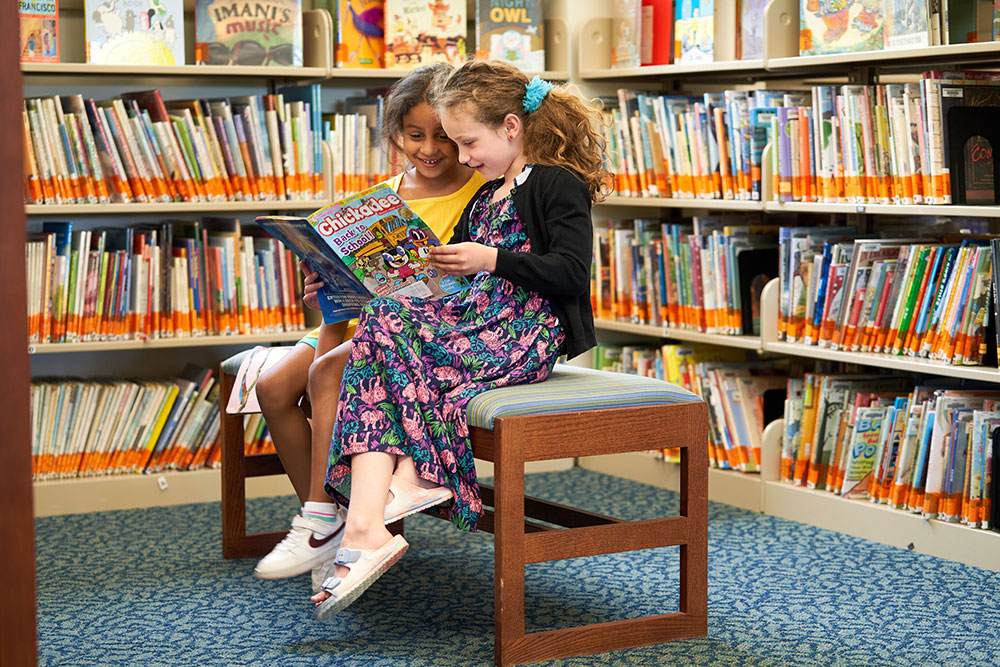
As students enter the Lower school in first grade, they continue to use the First Steps in Music curriculum which develops the whole musician through internalizing the pulse of music, singing beautifully and in tune, and by creating and experiencing artful moments through movement and song.
Students also begin pre-literacy activities in the lower elementary grades which prepare them for the shift in our program that combines elements of Gordon's Music Theory and the Conversational Solfege curriculum in the upper elementary grades. This builds on the First Steps in Music curriculum by stretching students to use their foundational skills to become fully musically literate. Musical literacy includes reading music notation, but also sight-singing and the ability to hear the music in your head before you sing or play.
In addition to the Conversational Solfege curriculum, students in the upper elementary grades play the “Orff” instruments such as the xylophone, drums, ukulele, and recorder. This enhances individual skills and helps each class work together to communicate musically and prepares them for instrumental offerings in the Upper School.
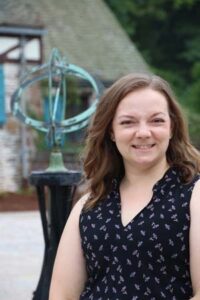 About Jess Pietrosanti
About Jess Pietrosanti
Jess Pietrosanti, from North Granby, attended Ithica College where she earned a bachelor's degree in music education and then Boston University where she earned a master’s in music education. Jess developed into a musician because of her very own inspirational music, choir, and band teachers.
She began teaching in 2006 and joined Renbrook School in 2022. Jess has taught preschool through high school music and band classes. Outside of school, Jess performs with the Torrington Symphony Orchestra and is a member of a pit band for local musical theatre companies.
Additionally, when Jess is not in her classroom, she enjoys reading, knitting, crocheting, cooking, and baking for her husband, Tom and children, Izzie and William. She also has a deep love of horseback riding and spends as much time as possible in the barn.
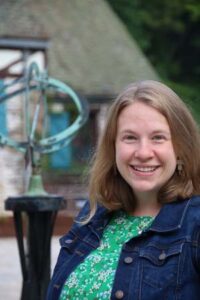
About Katie Dawson
Katie Dawson, Renbrook’s Performing Arts Department Chair, earned both her bachelors and masters of music education from the Harrt School, University of Hartford. She began her teaching career in 2011 and has taught preschool through grade twelve chorus, band, general music, and musical theater.
Katie absolutely loves her role in education, particularly because she works with such a wide range of ages. She finds it a privilege to observe students grow through a school and help them become their best selves.
When not in the theatre and music rooms, Katie enjoys spending time with her son, Ronan, and husband, Justin. She loves going for walks, playing board games, and cooking.
Renbrook’s Lower School Art Program emphasizes observation, collaboration, critical thinking, and creativity. Students in grades one through four are introduced to a variety of techniques such as printmaking, painting, ceramics, drawing, sculpture, and mixed media. Students become familiar with a wide range of materials including clay, oil pastels, tempera, and watercolor paint, paper mache, and wire.
Many projects revolve around the study of art history, the elements of design, and multi-cultural, global art. The Lower School Art Studio is a large, light-filled space equipped with a kiln, expansive storage areas, multiple work surfaces, and a smart TV. Classes meet weekly throughout the school year, and student work is displayed throughout the school creating a yearlong art show for all to enjoy.
Grade One and Two students build upon the foundations established in their Beginning School Art experiences. Lessons draw from a rich and varied framework. Projects throughout the year are inspired by the natural world, art history, and children’s literature reflecting each child's interpretation of a central theme, which can include friendship, inclusion, cultural awareness, and kindness. A more formal introduction to the elements of design (line, space, shape, color, value, texture, and form) is also a vital part of the Grade One and Two art experience.
There is an interdisciplinary approach to art in grades three and four to enhance their learning as well as introduce them to a variety of art materials and techniques. Grade Three students study the Hudson River School and the ways American art was influenced by Westward Expansion. They also take a closer look at artists throughout history who immigrated to the United States. Grade Four students spend much of their year studying the cultural diversity found in art which is aligned with their United Nations Global Goals study. By opening our students' eyes to the world of art around them, they make connections to other cultures with a sense of inclusion and compassion.
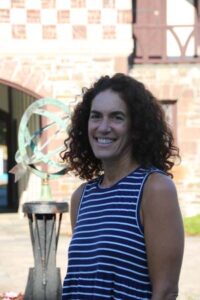 About Becky Klein
About Becky Klein
Becky Klein, an art educator with over twenty-five years of experience, earned a BA in art history from Skidmore College and an MA in art education from the University of Nebraska.
Having grown up in Suffield, CT, Becky was thrilled to join Renbrook’s teaching staff in 2011. She became an art teacher because of a number of influential teachers in her life that inspired her to pursue education. The creative process with young learners inspires Becky to collaborate with her colleagues in order to integrate art into the content her students are learning.
When not in the art studio at Renbrook, Becky loves spending time outdoors with her family. She creates art at home, enjoys working in her yard, and playing with her children.
The STEM program at Renbrook is centered around the philosophy that in authentic environments, effective solutions to problems require knowledge and skills from multiple content areas. We believe it is crucial that students learn how to fuse prior knowledge with new tools and information to think critically and problem solve effectively. Students are guided through an engineering design process as they learn to gather information, brainstorm, plan, create, and improve. We believe there is more value in experiential learning than in a successful “final product”, and we emphasize the importance of questioning, exploring, and reflecting.
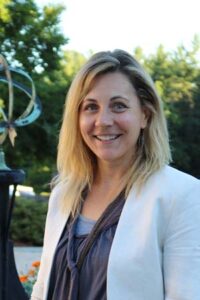 About Jess Wawzyniecki
About Jess Wawzyniecki
Having grown up with two scientists as parents, Jess Wawzyniecki spent a lot of time in nature learning about all things pertaining to biology and chemistry. She attended the University of Connecticut, Storrs, and earned a BS and MA in science.
Jess began teaching in 2007 and joined Renbrook as a STEM teacher in 2018. She finds the curiosity of her students remarkable and loves aiding in their awareness of how things work.
Outside of school, Jess enjoys being outside with her children, Ben and Maggie, cooking for her family and friends, and shopping for vintage fashion.
In Grade One, students explore the question: To what extent do spatial relationships influence the relationship between and among organisms and places? They do this by exploring how their five senses help them make observations, discover new things, and ask questions about the world around them on planet Earth and beyond. Students explore how the sun, moon, and stars change position in the sky and how this affects their daily lives; how sound and light can be used to communicate and solve problems; and they look at how plants and animals use their superpower senses and adaptations to survive in each of their environments.
Signature Projects:
- Designing Parachutes (Aerospace Engineering)
- Creating Sound Effects for a cartoon (Acoustical Engineering)
- Designing Solar Ovens (Green Engineering)
In Grade Two, students explore the question: How can examining cause and effect help us understand relationships between organisms, land and water, and changes in matter? They do this through questioning and observing how water can reshape the earth's surface; diving deep into the dirt and discovering how vital soil is to existence; exploring how a material's properties have a direct effect on its function; examining the many factors that can contribute to a plant's survival; and studying the many cause and effect relationships within animal species and their habitats. Biodiversity is the underlying theme for Grade Two, and students learn about the wide variety of life on Earth.
Signature Projects:
- Improving the process of making play dough (Chemical Engineering)
- Designing Model Membranes (Bioengineering)
- Evaluating a Landscape (Geotechnical Engineering)
In Grade Three, students explore the question: To what extent can studying evidence from the past help us make predictions, prevent future problems, and make decisions that will affect the future? They do this through investigating how clouds are formed and creating arguments using evidence about weather predictions; analyzing the history of the earth's climate and identifying problems that have arisen due to rising temperatures; identifying the relationship between changes in the environment and the survival of organisms that live there; discovering how pollination works and studying how humans continue to make food plants even more useful; and studying how force changes form and how this allows students to have a larger impact on the world.
Signature Projects:
- Design a weather station
- Explore and build different types of bridges (Civil Engineering)
- Designing a Maglev System (Magnetism & Transportation Engineering)
- Create a hand pollinating device (Agricultural Engineering)
In Grade Four, students explore the question: How can the understanding of transformations be used to impact our role in the larger system? They do this through building models of different body parts and determining how they can transform the information collected into information coded for robots; investigating the ways land transforms and using that to analyze patterns in land and rock; discovering how sound works and connecting it to how their ears sense vibrations and transform sounds; and designing systems to observe how energy transforms from one form to another and using that information to design a chain reaction.
Signature Projects:
- Design a Knee Brace: students study how the leg works and design and test a knee brace (Biomedical Engineering)
- Create a Petroglyph: students study rock properties and types to create a replica of a cave drawing. (Materials Engineering)
- Rube Goldberg Machine: students study how energy transforms and design a Rube Goldberg Machine. (Industrial Engineering)
- Design an Alarm Circuit: students build circuits (Electrical Engineering)
At Renbrook, we believe fitness, athletics, and sportsmanship are integral to a child’s schooling and health. We design physical education classes to provide well-planned and sequential lessons that help students to build skills, understand concepts, and learn about the importance of health and wellness.
Cooperation, respect for self and others, teamwork, and competition are woven into all activities. We emphasize safety and develop a competitive mindset while maintaining a commitment to good sportsmanship.
Renbrook’s traditional gymnasium, gymnastics studio, as well as many athletic fields, full-sized turf field, high and low ropes challenge courses, and outdoor tennis and basketball courts provide a variety of real-life settings for students to hone their athletic skills.
Lower School students in grades one through three participate in skill-themed and movement units. Lessons include physical fitness, skill development, and learning concepts and strategies in modified game situations. We aim to help students adopt a can-do attitude. They are encouraged to develop a sense of achievement through their effort and perseverance.
Students in grade four are introduced to team sports. Sport-specific skills are developed through modified games. More complex sports concepts and strategies are incorporated and practiced through drills and modified games.
Grade four students also explore and develop their individual fitness levels. Utilizing the FitnessGram, we measure their cardiovascular endurance, muscular strength, and flexibility. The data serves to help track fitness development and helps emphasize the importance of health, wellness, and exercise.
Finally, grade four students are introduced to our locker rooms and expected to change into a PE uniform for each class. They learn locker room etiquette and responsibility by managing their locker, a lock, and their clothing and equipment.
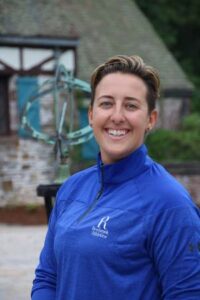 About Carley Elkin
About Carley Elkin
Carley Elkin is passionate about physical education and believes in the development of spirt, mind, and body. She earned a BS in movement and sports studies and a MS in physical education advanced pedagogy from Springfield College.
Carley is an advocate for adventure and outdoor education and has worked with children as young as preschool up through higher education. A former collegiate lacrosse player, Carley enjoys teaching physical education during the school day and coaching a variety of sports for Renbrook Upper School students.
When not in the gymnasium or on an athletic field, Carley enjoys spending time with her wife, Liza, hiking, cooking, reading, being outdoors, and participating in Brazilian Jiu Jitsu.
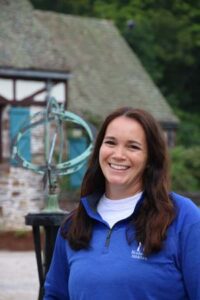 About Natalie Kirkpatrick
About Natalie Kirkpatrick
Natalie Kirkpatrick, originally from Sussex, England, earned a BA from the University of Birmingham in Leisure Management and a MA from Manhattanville College in physical education and sports pedagogy.
Natalie began teaching in 2012 and came to Renbrook in 2014. She grew up loving all sports and was influenced to become a physical education teacher because of her own teachers and coaches who instilled in her valuable life lessons of teamwork and perseverance.
When not teaching PE or coaching, Natalie enjoys going to the gym, playing sports, and spending time with her children, Piper and Riley, and husband, Donny.
Renbrook’s Lower School Spanish Program aims to expand students’ communicative abilities by teaching them to understand and speak another language while simultaneously giving students greater appreciation for and understanding of global cultures. In addition to language skills, students are taught about traditions and beliefs held in Hispanic and Latino communities in the United States and around the world.
Renbrook’s excellent preschool through eighth grade Spanish program provides students an early start to learning Spanish, which allows them to reach higher levels of proficiency and gain native-like pronunciation. Our classes provide students with the tools they will need to become life-long communicators in Spanish.
By studying a new language and understanding new cultures, students are able to share and engage in an expanded community of ideas and perspectives. Our language program teaches Spanish through the use of learning materials that are relevant and meaningful to students in order to make instruction more engaging and comprehensible.
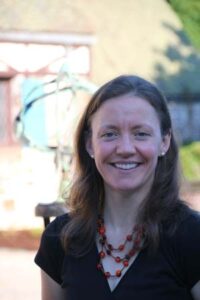 About Maureen Louis
About Maureen Louis
Maureen Louis, a passionate educator who believes in the power and gifts of education, works to help her students on their journey to self-discovery. She began teaching in 2007, having taught general elementary in grades four, five, and six, and then she made the transition to teaching Spanish for students in grades preschool through ninth.
Maureen earned a BA in education from the College of the Holy Cross and a MA in Spanish linguistics from Middlebury College. She joined Renbrook School in 2013.
When not in her classroom, Maureen enjoys spending time with her children, Elena and Jamie, and husband, Michael. They are an active family who always look for the beauty in everyday life.
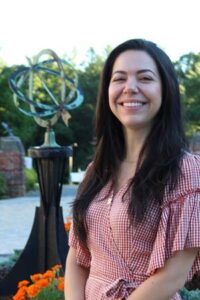 About Camila Pina
About Camila Pina
Camila, originally from Brazil, earned a master's degree in language and Spanish Culture from the Universidad Pontificia de Salamanca in Spain. She loves learning and connecting with her students and helping them construct deeper knowledge. Having taught students in kindergarten through college, Camila notes that she can’t imagine any other career as rewarding as one in which she helps others construct new knowledge.
When Camila is not teaching Spanish, she enjoys spending time with her husband, Jon traveling the world, dancing, and reading.